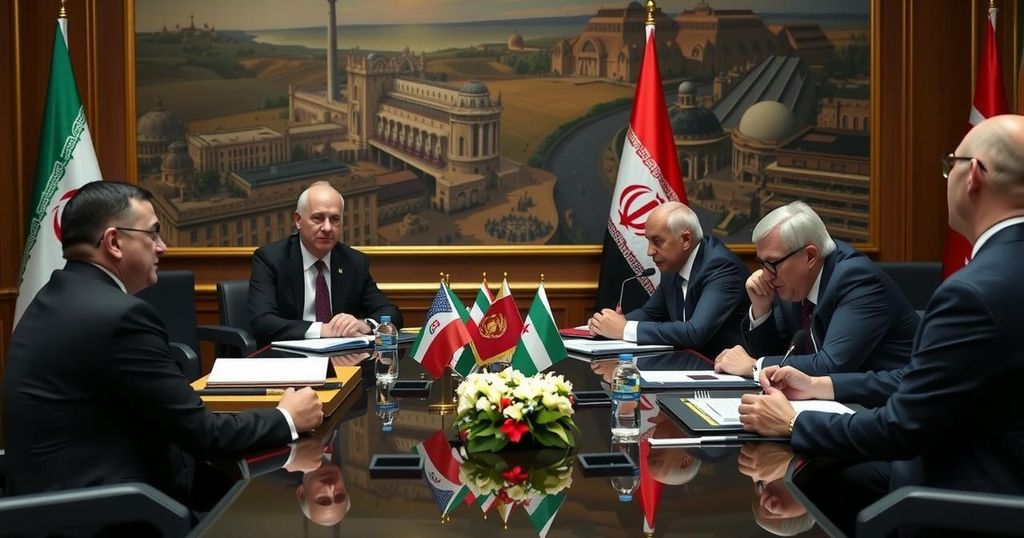The Iranian foreign minister’s adviser, Ali Asghar Khaji, met with Syrian delegates in Astana to discuss the future of Syria, emphasizing regional stability and support against Israel. As part of a six-year dialogue involving Turkey and Russia, the talks aimed at fostering cooperation and addressing recent tensions. Concurrently, Iran is enhancing ties with Saudi Arabia and preparing for a possible Arab summit in Iraq to further discuss these themes.
Ali Asghar Khaji, a senior adviser to the Iranian foreign minister, engaged in discussions with a Syrian delegation in Astana, Kazakhstan. This meeting, which represents the 22nd iteration of the Astana process initiated six years ago, aims to foster dialogue among Iran, Russia, and Turkey concerning Syria’s future. As the Syrian regime strengthens its authority in the western regions of the country, Moscow and Tehran are intent on facilitating reconciliation between Turkey and Damascus. Iran is placing significant importance on this dialogue, despite uncertainty surrounding Moscow’s and Ankara’s commitment to the process. The discussions centered on addressing the “crimes of the Zionist regime” and mitigating regional tensions. Following bilateral meetings with Syrian representatives, further interactions occurred on the sidelines with Russian and Turkish delegations. In these discussions, parties addressed recent political developments in the region and the Syrian landscape, underlining the importance of the strategic relationship between Syria and Iran. Iran continues to leverage meetings with Iraqi officials and discussions in Saudi Arabia to consolidate its stance against Israel, emphasizing regional cooperation to restore stability and security while assisting Palestine and Lebanese interests. Born out of a necessity to resolve the ongoing Syrian civil war, which commenced in 2011, the Astana format talks have been under the auspices of guarantors Iran, Turkey, and Russia. Concurrently, Iran’s Vice-President Mohammad Reza Aref extended an invitation to Saudi Crown Prince Mohammed bin Salman to visit Tehran, reflecting improved relations in recent years. Aref remarked on the broader benefits of enhanced ties, asserting that they would foster regional cooperation and solidarity. In an emerging development, Lebanese newspaper Al-Akhbar reported Iraq’s intention to host an Arab summit in May aimed at addressing regional matters. This summit is anticipated to reinforce Iran’s ties with Arab nations while continuing to criticize Israel, which Iran has purportedly utilized as a backdrop for its proxy operations through militias operating within Iraq.
The Astana process, initiated in January 2017, is a diplomatic initiative involving Iran, Turkey, and Russia, aimed at resolving complex issues stemming from the Syrian civil war. This multilateral dialogue has facilitated ongoing conversations on the future governance and territorial integrity of Syria. As the Syrian regime consolidates its military strength under Bashar al-Assad, Iran and Russia have increased efforts to stabilize the region by addressing tensions with Turkey and involving various stakeholders, including regional Arab nations. In addition to Astana discussions, Iran and Saudi Arabia have taken significant steps in recent years to reconcile relations, which had been historically strained. The evolving geopolitical landscape has prompted calls for greater regional cooperation, addressing both security concerns and fostering economic ties.
In conclusion, the latest meeting in Astana underscores Iran’s strategic commitment to fostering diplomatic relations with Syria and advancing regional stability amid the ongoing complexities of the Syrian conflict. Through its engagements, Iran aims not only to address the perceived aggressions of Israel but also to enhance its geopolitical influence within the region. Simultaneously, improved relations with Saudi Arabia offer a potential pathway for collaborative efforts among Islamic nations that may stabilize the broader Middle East.
Original Source: www.jpost.com






